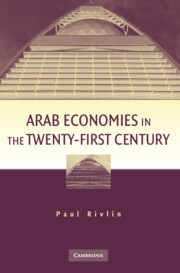10 - Saudi Arabia
Oil Wealth and Unemployment
Published online by Cambridge University Press: 05 June 2012
Summary
Saudi Arabia's economic development is perhaps the most dramatic in the Middle East. Since the early 1970s, it has been transformed from a backward and isolated desert kingdom to the largest economy in the region with massive oil income, investment projects, and financial reserves. Between 1970 and 2005 the national income increased nearly eightfold, while the population grew more than fourfold, from nearly six million to over 25 million (see Table 10.1).
Rapid economic growth has had mixed results in terms of development and one of the consequences is that Saudi Arabia now suffers from a high rate of unemployment. In the 1970s and early 1980s, oil income was used to develop the social and economic infrastructure and create a huge bureaucracy. Saudis were encouraged to have large families because it was believed that the country's large geographical area and oil resources could not be defended with such a small population. Population growth was accompanied by urbanization, especially in the largest cities. In 1960, 30 percent of the population was urbanized; by 2000, the share was 86 percent. Improved health services had dramatic, beneficial effects on longevity and infant mortality and thus on the size of the population. In the 1970s and 1980s, increased oil wealth was channeled in ways that maintained loyalty to the regime. This loyalty depended on a continuous flow of funds, and the role of key families was crucial. They were rewarded with business contracts so the oil wealth did not undermine the social structure.
- Type
- Chapter
- Information
- Arab Economies in the Twenty-First Century , pp. 218 - 239Publisher: Cambridge University PressPrint publication year: 2009



